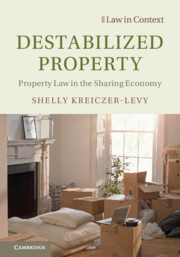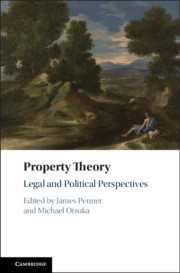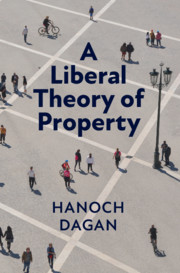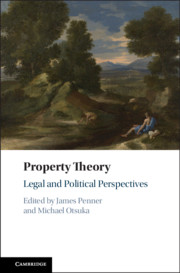Destabilized Property
The sharing economy challenges contemporary property law. Does the rise of access render our conception of property obsolete? What are the normative and theoretical implications of choosing casual short-term use of property over stable use? What are the relational and social complications of blurring the line between personal and commercial use of property? The book develops a novel conceptualization of property in the age of the sharing economy. It argues that the sharing economy pushes for a mobile and flexible vision of engaging with possessions and, as a result, with other people. Property's role as a source of permanence and a facilitator of stable, long-term relationships is gradually decreasing in importance. The book offers a broad theoretical and normative framework for understanding the changing landscape of property, provides an institutional analysis of the phenomenon, discusses the social, communal, and relational implications of these changes, and offers guidelines for law reform.
- Provides a theory of the impact of the sharing economy on property law and a theoretical account of the changing landscape of property
- Offers a normative legal account of the sharing economy impact on property law and provides recommendations for law reform, including platform accountability, regulation of the sharing economy and reforms to antidiscrimination laws
- Discusses changing consumption patterns, and the preference of access over ownership in property law and analyses the social, communal and relational implications of the changing landscape of property, due to the rise of access
Reviews & endorsements
'Shelly Kreiczer-Levy’s Destabilized Property: Property Law in the Sharing Economy is a major work on a timely subject. This is a sophisticated book, combining nuanced, conceptual and normative analyses with pragmatic suggestions for law reform. This book is a must read for anyone interested in the sharing economy or in property theory.' Hanoch Dagan, Stewart and Judy Colton Professor of Legal Theory and Innovation, Tel-Aviv University
'Of all writers about the rise of the sharing economy, Shelly Kreiczer-Levy is recognized internationally as the most keen observer and the leading theorist in the field. Just as the internet forced us to rethink information and access, the sharing economy forces us to rethink what property means and its role in human lives. The sharing economy shakes the very foundations of the idea of property as a small, exclusive, privatized space, and with this challenge comes both great promise and intense social conflict. This book is brilliant and must be read by anyone who wants to understand this movement. It is the classic in the field.' Laura S. Underkuffler, Cornell University, New York
'The age-old institution of private property keeps changing, and the sharing economy poses unique challenges to ensure the right mix of fairness and flexibility. We could have no better guide than Shelly Kreiczer-Levy to the ways that property law must adjust to this new environment.' Joseph William Singer, Bussey Professor of Law, Harvard University, Massachusetts
Product details
January 2020Hardback
9781108475273
196 pages
255 × 178 × 15 mm
0.51kg
Available
Table of Contents
- Acknowledgments
- 1. Introduction
- 2. Stability and property use
- 3. The decline of stability in the new millennium
- 4. The rise of the access economy
- 5. Access as an alternative to ownership
- 6. Fragmentation of intimate property
- 7. Evaluating flexibility in property use
- 8. What's next? The future of the access economy
- 9. Conclusion.










